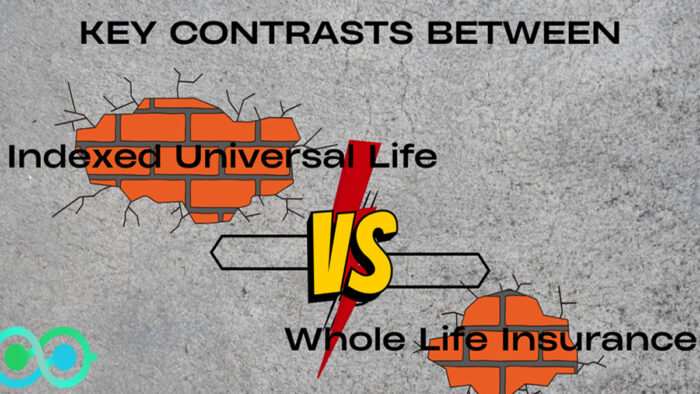The primary difference between whole life insurance and indexed universal life (IUL) insurance is how the cash value works. The cash value of whole life insurance grows at a fixed rate of interest. In contrast, insurance firms base the cash value of IULs on the performance of a stock market index. IUL also differs from traditional universal life insurance, which provides a cash value that grows at non-equity earned rates.

What is whole life insurance?
Whole life insurance is a type of permanent life policy that offers customers lifetime coverage as long as they pay their payments. This type of insurance includes an investing component known as the cash value. This rises at a guaranteed pace over time and serves as a type of investment or savings. Whole life insurance has greater rates than term life insurance, but it provides stability throughout your life.
What does whole life insurance cover?
Here are some instances and incidents where your whole life insurance coverage will come in helpful. They include:
- Estate planning.
- Death benefits.
- Lifetime coverage.
- Cash value buildup.
So, with a whole life insurance policy, you will be covered for all of the things described above.
What does it not cover?
- Here are the exclusions and scenarios that whole life insurance would not cover:
- Immediate complete coverage.
- Building wealth.
- Specific conditions and riders.
- High return on cash value.
This insurance will not cover the following, unless an insurance carrier gives coverage for them.
What is indexed Universal Life Insurance?
Indexed universal life insurance (IUL) is permanent life insurance that includes both a death payout and cash value. In addition, the money in your cash value account will earn interest by tracking a stock market index established by the insurer. In addition, the policyholder receives a fixed-rate account with the option to specify how much money should be transferred to each account.
How does it work?
Indexed universal life insurance, a type of permanent life insurance, functions in the same way that universal life plans do, with the exception of how cash value is built. IUL cash value provides for growth based on a stock index (a collection of different equities) rather than only non-equity earned rates. IUL, like universal life, allows you to alter your premium as your cash value develops, with the goal of eventually achieving a zero-cost policy in which your cash value pays for all premiums.
Pros
- Offers better returns than other types of life insurance.
- Policies can be tailored to a holder’s desired level of risk.
- Allows for tax-free capital gains.
- Policies don’t lower Social Security benefits.
- Cash value can be utilized to reduce or cover premiums without affecting the death benefit.
- Certain plans may provide cash value designations in several indexes.
- You don’t have to pay capital gains on cash value rises unless you cancel the policy before it matures.
- Policies may permit emergency access to monetary values; nevertheless, costs will apply.
Cons
- Rates of return are normally between 8% and 12%.
- Investing in an index might result in changing returns and varied premiums over time. Investors should
- Be prepared to budget for possibly higher premiums.
- Premium, administrative, and commission fees may be higher than those for comparable insurance.
- Rates of return may underperform the stock market during upswings.
Main differences between IUL vs. Whole Life Insurance
As stated earlier, the main difference between whole life insurance and indexed universal life (IUL) insurance is how the cash value operates. Whole life insurance’s cash value grows at a fixed interest rate.
In contrast, insurance companies determine the cash value of IULs based on the performance of a stock market index. IUL is also distinct from ordinary universal life insurance, which gives cash value that rises at non-equity earned rates.
| Feature | Indexed Universal Life (IUL) | Whole life insurance |
| Premium | Flexible, can vary over time | Fixed; do not change with age. |
| Death benefit | Can increase with cash value growth | Guaranteed, fixed amount |
| Cash value growth | Tied to market index performance | Guaranteed growth at a fixed rate |
| Investment risk | Higher potential returns, riskier | Lower returns, safer option |
| Flexibility | More customizable | Less flexible, stable structure |
| Management complexity | Requires more oversight | Simpler, less management needed |
IULs offer potential for higher returns but involve more risk, while whole life provides stability and predictability.
Frequently Asked Questions
How do the cash value components differ between IUL and Whole Life Insurance?
In an IUL policy, the cash value component’s growth is linked to the performance of a selected stock market index. This means that the cash value growth potential can be higher, but it also carries more risk. In contrast, Whole Life Insurance policies offer a fixed, guaranteed interest rate for the cash value component, providing stable and predictable growth.
What are the premium differences between IUL and Whole Life Insurance?
Premiums for IUL policies are generally more flexible, allowing policyholders to adjust their premium payments within certain limits. Whole Life Insurance policies typically require fixed, level premiums throughout the policy’s lifetime.
Who might benefit from an IUL policy, and who might prefer Whole Life Insurance?
Individuals who are comfortable with some risk and seek potentially higher returns on their cash value component may find IUL policies more appealing.
Those who prioritize stability and predictability in their cash value growth may prefer Whole Life Insurance. It’s important to consult with a financial professional to determine which option best suits your needs and financial goals.



